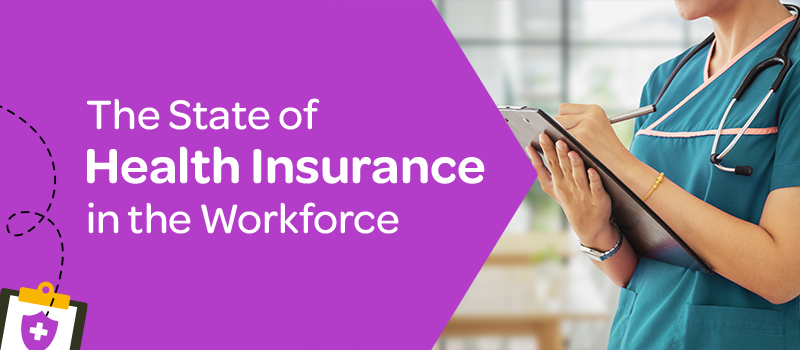What’s the Buzz
The Bee Healthy Blog
Health Coverage Concerns of Working Americans

Health insurance is a safeguard against life’s uncertainties. But how do different generations in the workforce perceive and navigate the complicated maze of health coverage in America? Through a comprehensive survey of 1,012 full-time employees and 137 self-employed individuals, we’ve parsed out the top generational views on health insurance, from what a good plan should include to what they’ll do to keep one. Join us as we explore Americans’ unique challenges, aspirations, and potential paths forward along the journey to protecting their health.
Key Takeaways
-
Nearly 1 in 6 Americans dislike their job but stay for the health insurance benefits.
-
Americans are willing to endure unfulfilling work (38%) and limited career advancement (28%) to retain employer-sponsored health care coverage.
-
The risk of losing employer-sponsored health insurance deters nearly half of full-time employees (45%) from pursuing self-employment.
-
Over half of Gen Zers (55% of respondents under 26) are concerned about their future health coverage.
Sticking Around for Health Coverage
With 27.6 million Americans lacking health insurance last year, coverage is far from guaranteed, which could explain the lengths to which many will go to get it and keep it.

Many Americans can’t afford health insurance, making employer-sponsored plans highly valuable for their lower cost to employees. It might also explain why nearly one-sixth of employees have stuck it out in jobs they dislike due to a need for health insurance benefits.
And these weren’t just long-tenured employees; nearly 1 in 10 workers who were fresh in their roles (holding them for a year or less) have done so. Overall, most respondents were willing to endure unfulfilling work (38%) or limited career advancement (28%) prospects in exchange for employer-sponsored coverage.
This narrative became more complex when we looked at some demographic distinctions. For instance, Gen Zers (29%) were more likely than millennials (25%) to stay in jobs that lack creativity or autonomy to retain their health care coverage. Meanwhile, Gen Xers (32%) were more likely than millennials (27%) to stay in jobs with limited advancement opportunities. As for the gender divide, women were 40% more likely than men to be willing to deal with high stress at work if it meant keeping their health insurance.
Coverage Conundrums for the Self-Employed
This health care dilemma may impact many workers’ career decisions. Next, we’ll examine the health insurance-related challenges our self-employed respondents face.

The leap into self-employment is often checked by a practical concern: health insurance. The threat of losing employer-provided health coverage has deterred nearly half of full-time employees from making the switch.
However, this caution was less pronounced among Gen Z workers — they showed less hesitation about giving up these employee benefits. Perhaps they have fewer health concerns weighing on their minds than their older counterparts. They may also have less experience with the complexities and often high cost of individual marketplace insurance plans compared to employer-provided plans.

Looking ahead, over 1 in 10 self-employed individuals said they’ll be without health insurance in 2024, underlining the vulnerability of the independent workforce. The draw of employer-sponsored health insurance remains strong, with nearly 3 in 10 self-employed workers conceding that it might sway them to abandon their solo ventures in favor of this valuable benefit.
The Future of Health Coverage
As we looked further into generational differences regarding health insurance, we uncovered a web of concerns and preferences shaping their approach and what they’d like to change.

Over half of Gen Zers (55%) were concerned about their future health coverage. They were under the age of 26, which is also when most people lose coverage under a parent’s health plan. This unease was primarily driven by concerns about the soaring costs of insurance (67%) or the uncertainties about their future health needs (38%). Some others (30%) were overwhelmed by the complexity of insurance plans, and 26% worried they might not have access to mental health services.
This last point is particularly poignant given that Gen Z was also 121% more likely than millennials to desire support for psychiatric medications. Many of these, such as Zoloft and other medications for depression and anxiety, require a medical specialist to prescribe them. After that, it’s a matter of whether or not the insurance provider will cover the prescribed medication. This is just one of the many complexities of navigating modern health care in America.
Millennials appeared to possess a relative edge in understanding these complexities. They were 13% more likely than Gen Z to say they’re informed about the American health insurance system. Millennials were also nearly as interested as Gen Z in using mobile apps for prescription reminders and appointment scheduling (18% compared to 20%) and in online tools for managing insurance claims and health records (21% compared to 24%).
Tailoring Insurance for Tomorrow’s Workforce
Our study highlights different generations’ diverse and complex relationships with health insurance. Gen Z faces anxieties about costs and coverage continuity, especially as they transition off parental plans. The complexities of navigating insurance also stand out, as do many workers’ willingness to compromise career satisfaction for health benefits. This research sheds light on health coverage’s critical role in career and employment decisions and suggests a need for improving understanding and accessibility of health insurance.
Methodology
We surveyed 1,012 full-time employees and 137 self-employed individuals to explore Americans’ sentiments about health insurance.
About BuzzRx
At BuzzRx, we’re dedicated to improving public health by making prescription medications affordable and accessible through our free prescription discount card. This card offers significant savings at over 60,000 pharmacies nationwide, ensuring everyone can access the medications they need.
Fair Use Statement
If this topic resonates with your audience, feel free to share our findings for any noncommercial use. Please include a link back to this page, allowing full access to our comprehensive study and its methodology.

SOCIAL